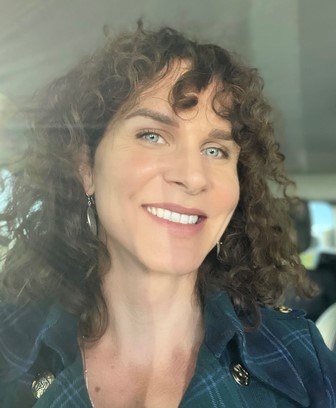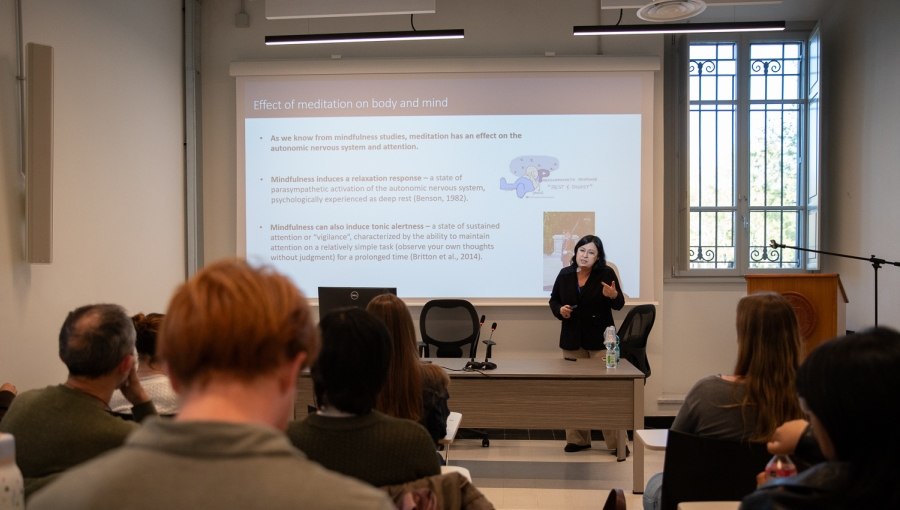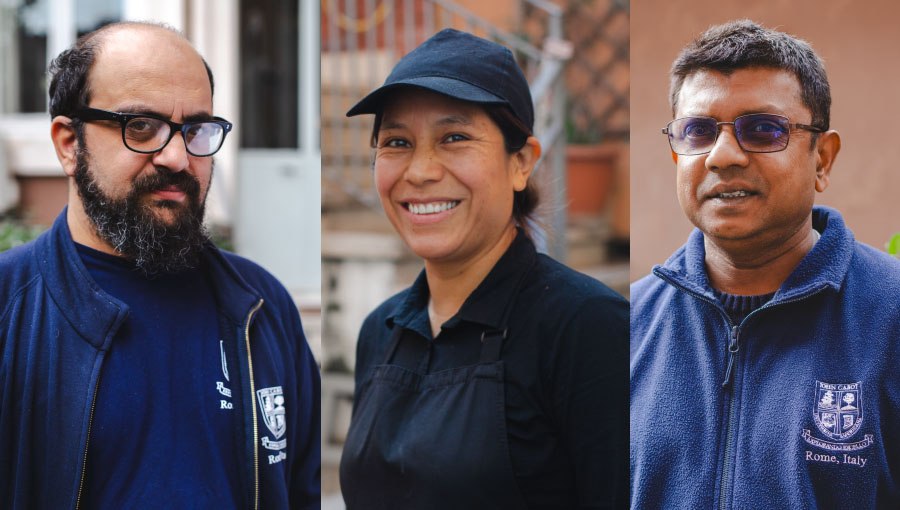Mind Over Matter: Psychology Professor Nicola Petrocchi
Professor Nicola Petrocchi, Ph.D, Psy.D, is a licensed CBT psychotherapist and student counselor. During his international Ph.D in Psychology and Social Neuroscience at the University of Rome “La Sapienza,” he conducted research on the effect of Loving Kindness Meditation (LKM) on patients with mild depression. Professor Petrocchi is an accredited Compassion Focused Therapy (CFT) therapist and trainer in Italy and Europe. He established Compassionate Mind Italia, the Italian association for the research, training, and dissemination of CFT in Italy. Prof. Petrocchi also worked with immigrants and refugees in Rome’s Immigration Center.

Professor Petrocchi
What drew you to Rome? How did you become a psychology professor?
I always loved the idea of moving to a bigger city, especially because I wanted to become a jazz singer! Not very easy in a town like Grosseto, Tuscany, where I grew up. My other big passion in life has always been psychology. In particular, since I was a child I’ve been fascinated by the idea of using the mind to change the world both inside and outside of myself. When I was eleven I found a book on self-hypnosis and I spent hours every day trying to hypnotize myself in the darkness of my room (much to my parents’ concern!). I was intrigued by the idea that the mind could heal the body and I guess that was my first approach to my actual research topic: how mindfulness and compassion meditation can influence our psychophysiology.
At the age of eighteen, I moved to Rome to study psychology at the University of Rome “La Sapienza.” I needed money and I ended up working in some TV shows as a singer and host, but I was terribly bored with that job. I felt like I needed to hide my authenticity to work there, that nobody was really interested in what I wanted to say. The experience helped me realize what I did not want in life. In the meantime, I graduated with a thesis on codependency – how and when love becomes an addiction. At that time, it was not easy to find research papers on the topic in Italy and, thanks to a scholarship, I went to Columbia University for six months to collect data. That was my first experience in America. Six years later during my Ph.D. studies, I spent over a year as a visiting scholar at Boston University, in the lab of Professor Stefan Hofmann.
After I graduated from La Sapienza, I started my specialization in Cognitive Behavioral Psychotherapy and then, in 2015, after my post-doc at the Santa Lucia research foundation in Rome with Cristina Ottaviani, I saw that John Cabot University was looking for adjunct professors of psychology. I found that the JCU mission resonated with my interests and research topics. I sent my CV and I was lucky to be invited to teach Health Psychology at JCU.
You are an accredited Compassion Focused Therapist (CFT). Tell us about this type of therapy and why you believe it to be effective.
Compassion Focused Therapy (CFT), created by Professor Paul Gilbert, is a system of psychotherapy that integrates techniques from cognitive behavioral therapy with concepts from evolutionary psychology, social psychology, developmental psychology, Buddhist psychology, and neuroscience. The central therapeutic technique of CFT is compassionate mind training, which teaches the skills and attributes of mindfulness and compassion. These techniques have proven to be very effective for people struggling with shame and self-criticism. CFT teaches you how to develop more awareness and compassion towards yourself and others as well as to be open to the compassion coming from others. Studies conducted in the field show that having a compassionate motivation will protect you from stress, depression, and anxiety and will have a positive impact on your immune system and cardiovascular health. Over the last seven years, I’ve been collaborating with the most prominent expert and scientist of compassion, Prof. Paul Gilbert, and I’m honored that this collaboration is still going on and producing very interesting research data. Thanks to his encouragement, I have founded Compassionate Mind Italia, an Italian organization, affiliated with the English organization founded by Paul Gilbert, the Compassionate Mind Foundation. The goal of all the CFT associations around the world is to help disseminate Compassion Focused Therapy by promoting good practice and research. I’m pleased to announce that the 2019 International Conference on Compassion Focused Therapy will be held in Rome, in collaboration with Compassionate Mind Italia. It will be a big event attracting many researchers and clinicians from all over the world and I hope that I’ll be able to invite some of the most famous speakers for a lecture at JCU.
What are the most common reasons that college students seek therapy? How does someone know that they should seek therapy?
Most students feel homesick and the problem for them is often that they did not expect that they would feel this way upon arrival. When we are 18 or 20 years old we all idealize what an experience will be and we might even be somewhat rigid about how it should go. Some other students struggle with more serious problems that become even more salient and painful once here in Italy, a foreign country with a foreign language. In any case, we should seek therapy when we feel that some of our reactions (for example, emotional reactions) start appearing strange to our own eyes, too. For example, too much anxiety, or not enough enthusiasm for things we would normally be excited about, or issues with our eating patterns.
What was it like to work with immigrants and refugees in Rome’s Immigration Center?
I worked in that center for 4 years, as an employee of Cooperativa Auxilium, as director of the counseling service for immigrants. It was a life changing experience for me. I would listen to people with incredibly difficult life stories. I shared their frustration, often their despair, at being sent back to their countries after such a difficult and dangerous trip through the Mediterranean Sea. In no other place in the world could I have learned the importance of listening compassionately and non-judgmentally to everyone. I often reminded myself that I could have been in their place, and that it was just a matter of luck that I was sitting on the other side of the desk. It was an immensely powerful “seminar” in compassion for me. Their smiles, their “thank yous” touched me deeply. Sometimes I feel they helped me more than I helped them.
What type of research projects are you working on now?
I started my research during my Ph.D. in Psychology and Social Neuroscience at the University of Roma “La Sapienza.” During this time I spent a year as a visiting scholar at Boston University. Professor Stefan Hofmann hosted me in his lab where I conducted a study on the efficacy of a mindfulness and compassion-based intervention on mildly depressed patients. At the moment, I’m collaborating with Cristina Ottaviani, and we are studying the effect of compassion-focused practices on heart rate variability, a cardiac index that reflects our emotional flexibility. Paul Gilbert, other colleagues, and I are also writing the first official manual of Compassion Focused Therapy. We have designed a 12-week CFT protocol and it is currently being tested in many parts of the world, including the U.S., under the leadership of Prof. Gary Burlingame (Brigham Young University, Provo, Utah), Australia, with Prof. James Kirby (The University of Queensland) and Germany, with Dr. Lisa Lyssenco of the Central Institute of Mental Health. Prof. Roberto (University of Rome “La Sapienza”) and I will test it in 2018 with a pool of LGBT individuals struggling with shame and internalized homophobia. It’s crucial to help the LGBT community to build emotional resilience, especially in a society that still discriminates against diversity. Some of the papers that came out of these amazing collaborations over the past years can be found here.
What is your teaching philosophy?
We tend to learn faster what we feel is most useful to us. I try to highlight the personal relevance in everything I teach. In my Health Psychology course, students explore all the psychological variables that predict better health or quicker recovery from illness. In every session, I try to create an atmosphere of total engagement and reflection about the students’ own lives. During my college years there were courses that literally changed my life and helped me navigate it better. I really hope that my course can have the same impact on students and can trigger their creativity and research interests.
Please tell us about a challenge you encountered in your work as a teacher or as a therapist. How were you able to overcome it?
The greatest challenges that I encountered were when I first had to learn statistics for analyzing my data, when I had to write the first paper, and teach my first course. Up to that point, I used to approach things with a perfectionistic attitude, or with an “all-or-nothing” approach. Then I realized that every goal, every task, no matter how difficult it is, can be “parceled out” into several baby steps. The success often lies in the ability to stay in the present, focusing on the problem at hand. I learned to embrace my vulnerabilities and to push myself beyond my limits. It’s also important to have friends and colleagues whom you admire and feel connected to. I would have never achieved my goals without the support, the kindness, and the compassion of the amazing people I have met and I’m still meeting in my career. I really owe a debt of gratitude to all of them.
What is your impression of JCU?
I frankly believe that both teachers and students are lucky to be here at JCU. This university encourages creativity and expressiveness from both and stimulates everyone’s potential. It is important to be in such an encouraging environment, especially at a moment when science is asking us to open our minds and go beyond our preconceptions. In particular, I feel that JCU is very open to mindfulness and compassion and I’m sure there will be many initiatives dedicated to cultivating these science-based practices in the JCU community.





